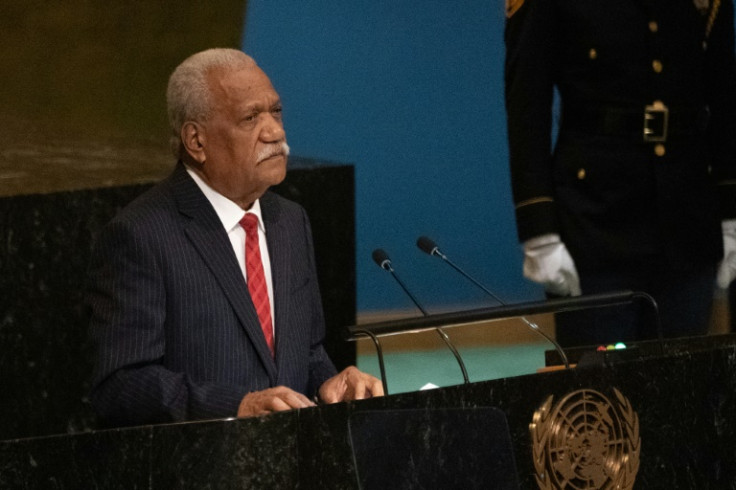At UN, Vanuatu Calls For Fossil Fuel Non-proliferation Treaty

Vanuatu on Friday became the first nation to launch a diplomatic push for a fossil fuel non-proliferation treaty, a proposed legal path to phase out coal, oil and gas globally by likening their threat to nuclear weapons.
In his address to the United Nations General Assembly, President Nikenike Vurobaravu evoked the existential crisis caused by rapid global heating, from hurricanes and coral bleaching to wildfires, prolonged droughts and flooding.
"Fundamental human rights are being violated, and we are measuring climate change not in degrees of Celsius or tons of carbon, but in human lives," he said.
"We call for the development of a Fossil Fuel Non-Proliferation Treaty to phase down coal, oil and gas production in line with 1.5C, and enable a global just transition for every worker, community and nation with fossil fuel dependence."
The Paris climate accord called on nations to aspire to limit warming to 1.5 degrees Celsius above pre-industrial levels, a goal that is far off track.
In a statement, the climate campaign group 350 compared the proposed treaty to accords that were pivotal in managing the threats of nuclear weapons and landmines.
Vanuatu, an archipelago home to 300,000 people that lies some 1,100 miles (1,750 kilometers) to the east of Australia, adds its voice to a call that has been endorsed by more than 65 cities and regional governments around the globe.
These include London, Lima, Los Angeles, Kolkata, Paris and Hawaii. The proposal has also been backed by the Vatican and the World Health Organization.
"The modern addiction to fossil fuels is not just an act of environmental vandalism. From the health perspective, it is an act of self-sabotage," WHO chief Tedros Adhanom Ghebreyesus said last week.
Tiny Vanuatu is already carbon negative, but it is among the world's most vulnerable countries to climate change. Its approximately 80 islands are threatened by rising sea levels, droughts and more intense storms.
In August, it submitted among the most comprehensive climate targets under the UN, including adding cost estimates for how much it required from major polluters in "loss and damage" payments for their historic and ongoing carbon emissions.
The issue is a major sticking point between rich and poor nations, and is set to be discussed at the next UN climate summit, COP27.
Vanuatu has also been leading a campaign to have the International Court of Justice issue an opinion on climate justice and human rights.
Campaigner Kalo Afeaki of Tonga said: "Fossil fuels did this, and if we continue to burn them, we will see more islands in the Pacific, islands like my home of Tonga, disappear. We need countries to be bold, because we have run out of time."
Without drastic course correction, the world is on track to 2.7C heating by the year 2100, according to the Climate Action Tracker.
This level of warming would dramatically reshape the world's climate systems, bringing extreme heat to vast swathes of the planet, depleting biodiversity and water availability, and devastating agriculture, among other impacts.
© Copyright AFP {{Year}}. All rights reserved.





















